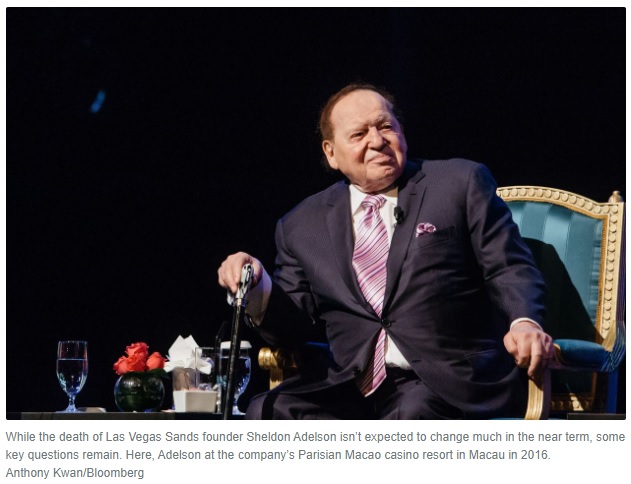The death this week of Las Vegas Sands founder, long time CEO, and controlling shareholder Sheldon Adelson should do little to knock the casino operator off course for now.
But there are some crucial questions for Las Vegas Sands (ticker: LVS) in the coming months, including whether it will sell its Las Vegas Strip operations and what happens to the Adelson family’s majority stake.
“We expect there should be little change in the near term” with respect to the management team and the company’s operating prospects, Jefferies analyst David Katz wrote in a research note Tuesday.
When the casino operator disclosed Jan. 7 that Adelson was receiving treatment for non-Hodgkin’s lymphoma, the board named Robert G. Goldstein, a 65-year-old company veteran who is president and chief operating officer, as acting chairman and acting CEO of Las Vegas Sands and Sands China.
In a research note Tuesday, Thomas Allen of Morgan Stanley wrote that he expects Goldstein to assume those positions on a permanent basis.
“Over time, we would not be surprised to see a member of the Adelson family take over one of these roles,” Allen added.
A key question for the company, Katz says, is what happens to Adelson’s 56.6% stake in the company. Possible outcomes include the Adelson family keeping that position; selling it in total, possibly to a Chinese entity; or selling it on the open market—the option Katz sees as least likely.
“Nonetheless, we expect the prospects for recovery and long-term growth should remain compelling to the Street broadly,” wrote Katz, who has the stock at a Buy with a price target of $66.
Las Vegas Sands stock was recently at $56 and change, with a one-year return of about minus 18%. In an email to Barron’s, Morningstar analyst Dan Wasiolek said he doesn’t expect much to change.
“While it is never easy to replace an icon, we believe investors should have confidence in interim CEO Rob Goldstein,” he wrote, adding that Goldstein has been Las Vegas Sands’ president and COO since early 2015, providing direction on existing and development properties. Goldstein, who has been with the company since 1995, also has played an active role on the company’s earnings calls, Wasiolek says.
Wasiolek doesn’t “expect the company’s focus on its investment-grade status, shareholder return of capital, or high return development requirements to change.” The company suspended its quarterly dividend in April amid the pandemic.
Allen noted that he expects the company to resume paying a dividend once its “business has a clearer path back to normal post-COVID and the balance sheet is slightly improved, though maybe at a lower payout ratio vs. history to allow for more growth/share buyback capital.”
Although the company is based in Las Vegas, where its signature properties include the Venetian Resort Las Vegas, it gets the bulk of its revenues and profits in overseas markets such as Macau and Singapore. In 2019, the Las Vegas properties chipped in about $1.8 billion of net revenues, or around $13% of the total.
The Wall Street Journal reported in October that the Las Vegas Sands was considering a sale of its Las Vegas Strip operations, a development the company confirmed at the time. Reached Tuesday, a company spokesman said there was no additional comment on that matter.
Adelson, who was 87 when he died, was regarded as an industry visionary and a major philanthropist. He was also known for his strong backing of Republican political candidates, including President Trump.
Barron’s Lawrence C. Strauss
